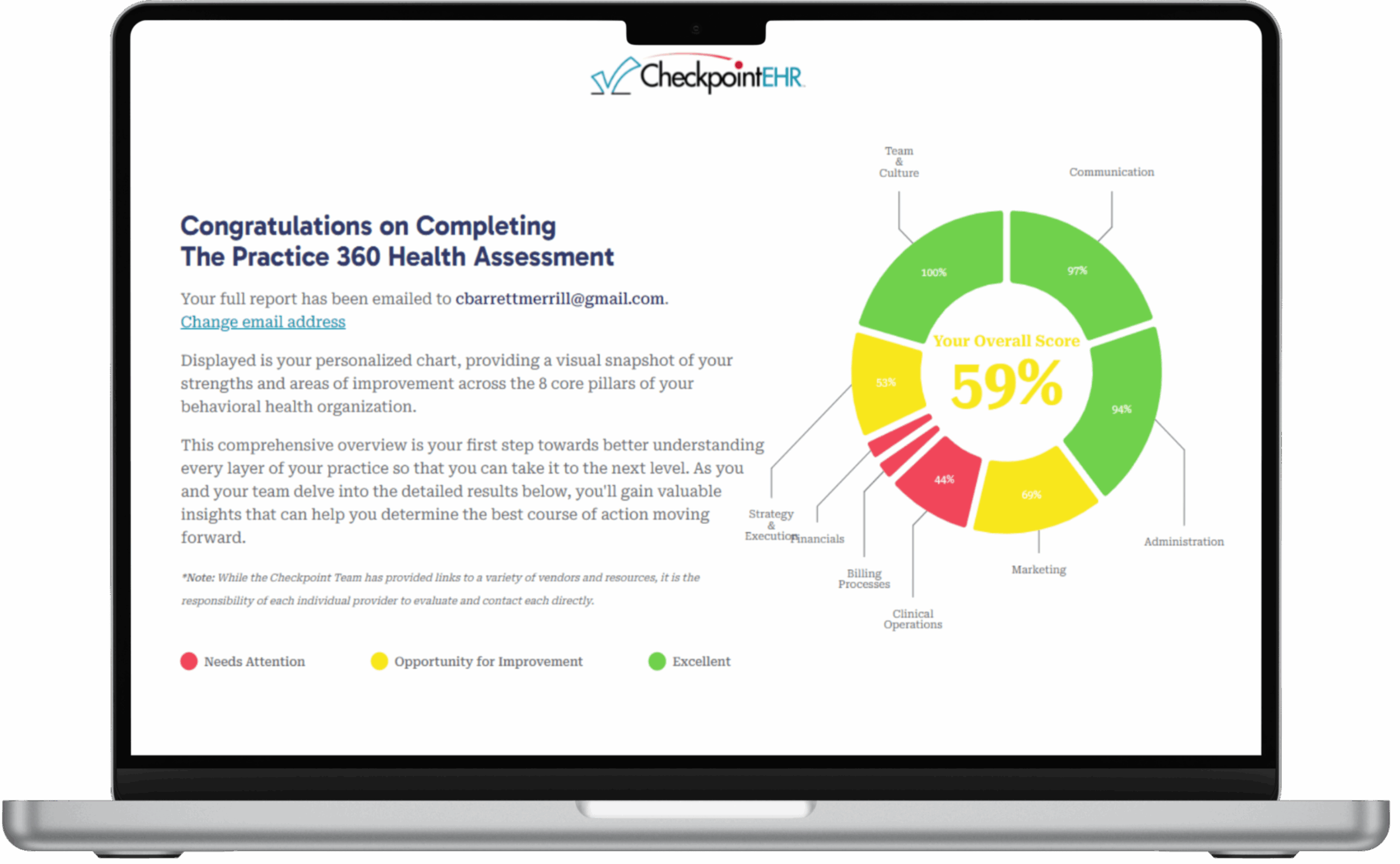8 Business Pillars for Therapy Practice Health

In the world of mental and behavioral health, it’s easy to focus so much on the care we offer clients that we forget to check in on the health of our own practice. But just like our clients need reflection and self-awareness to grow, so do our businesses. For private practice owners, clinical directors, and agency leaders, the long-term sustainability of your mission depends on how well your organization functions—not just clinically, but operationally.
Before diving into strategies or solutions, it’s essential to pause and take inventory.
Why Taking Inventory Matters
Taking time to evaluate the effectiveness and health of your practice is not just a luxury—it’s a leadership responsibility. Whether you’re a solo clinician or managing a growing team, your behavioral health practice is made up of interconnected systems and structures. Some may be running smoothly, while others might be limping along or completely overlooked.
Self-awareness is the first step to growth. In a clinical setting, we know that naming something gives us power over it. The same is true in business. When you and your team can clearly identify areas of strength, inefficiency, or confusion, you can begin to make intentional improvements that support both your clients and your staff.
Rather than operating reactively, hoping things hold together under pressure, healthy practices reflect regularly and make proactive changes. That’s where the 8 Business Pillars come in.
The 8 Business Pillars of Practice Health
Each of these pillars represents a vital component of your mental health therapy practice. Think of them as the internal organs of your business—when they’re working well together, your organization can thrive. When one is struggling, the entire body feels it.
1. Communication
Clear, consistent communication is the foundation of any healthy team. This includes how leadership communicates vision and expectations, how staff members collaborate, and how messages are delivered to clients. Poor communication leads to misunderstandings, burnout, and a breakdown in culture. Strong communication creates trust, alignment, and clarity—even in the face of stress or growth.
Ask yourself: Does your team have clear channels for feedback, updates, and decision-making?
2. Administration
Administrative systems are the engine behind your daily operations. Scheduling, paperwork, progress notes, and coordination all live here. Efficient systems save time, reduce errors, and ensure a better experience for both staff and clients. When administration is neglected, things fall through the cracks, and stress rises for everyone.
Ask yourself: Are your workflows and electronic health record streamlined and consistent? Is your team empowered with the tools they need?
3. Marketing
Mental health marketing isn’t about being flashy—it’s about building authentic connections and making your services visible to the people who need them. Whether you’re full or trying to grow, consistent and intentional marketing keeps your referral streams healthy and communicates your values to your community.
Ask yourself: Do you have a strategy to consistently reach and educate your ideal clients and referral sources?
4. Clinical Operations
This pillar includes everything related to service delivery—caseload balance, documentation quality, supervision, compliance, and clinical outcomes. It’s also where you measure how your services are actually functioning on the ground.
Ask yourself: Do your clinical systems support ethical, effective care and a sustainable workload for your mental health providers?
5. Billing
Behavioral health billing is often a pain point, especially for practices that accept insurance. But when your billing and claim submission systems are tight, your mental health practice becomes more financially stable and your team can focus on care, not chasing payments. Whether you handle billing in-house or outsource, it must be timely, accurate, and efficient.
Ask yourself: Are claims being submitted and followed up on consistently? Are you losing money due to billing gaps? Do you need to consider outsourcing to a 3rd party biller?
6. Financials
Understanding your numbers is non-negotiable for long-term sustainability. This includes budgeting, forecasting, payroll, owner compensation, and profitability. Many therapy practice owners avoid this pillar—but facing it head-on allows for clarity, strategic decisions, and peace of mind.
Ask yourself: Do you know your financial picture at a glance? Are you making informed decisions based on real data?
7. Strategic Execution
Even the best ideas fall flat without a clear plan and accountability. Strategic execution is about turning vision into action. It includes setting goals, creating timelines, delegating responsibilities, and regularly checking progress. Without it, businesses plateau or run in circles.
Ask yourself: Do you have a roadmap for your practice’s growth, and is your team aligned in carrying it out? Do you have a behavioral health EHR that can scale with your growing operations?
8. Team & Culture
Your people are your most valuable asset. A strong culture fosters belonging, professional growth, and shared values. It supports retention and resilience, especially in emotionally demanding work. Investing in team development and emotional safety pays dividends in morale and client outcomes.
Ask yourself: Is your team thriving, or just surviving? Do your values show up in your daily culture?
Your Next Step: Take the Practice 360 Health Assessment
It can feel overwhelming to assess all of this at once—but you don’t have to do it alone. The Practice 360 Health Assessment is a free 5-minute tool designed by CheckpointEHR specifically for therapy practices to evaluate these 8 pillars.
This quick but powerful assessment helps leadership teams gain:
- Greater self-awareness of operational strengths and weaknesses
- Alignment across team members on how things are really going
- Insight into blind spots that may be costing time, money, or energy
- A clearer path forward for strategic growth
👉 Take the free Practice 360 Health Assessment here
Whether you’re in a season of building, refining, or stabilizing, this is the perfect place to begin.
Self-awareness leads to growth. Don’t wait for burnout or breakdown to take a look under the hood. Gather your team, take inventory, and start moving your practice toward greater health—one pillar at a time.


